Tag: Spice Bridge
We knew it would take a village, and it did, and together we did it!
After many years of thoughtful planning, working with entrepreneurs and partners, and with a groundswell of support from you, our caring community…We did it! We met our capital campaign goal of $850,000!
Together, we built Spice Bridge, home to our Food Business Incubator program. This community treasure celebrates the rich food traditions of our vibrant, diverse community. Your support will have a lasting impact in helping women of color, immigrant, and refugee chefs access the resources they need to build thriving businesses.
We met our goal because of our community coming together to make this moment happen. Individuals, families, local businesses, community organizations, and foundations came together to build something tremendous together. Gifts of all sizes truly mattered in this campaign, added up they built Spice Bridge where everyone is welcome. Whether you gave $5.00 or $100,000, you helped make this happen, we see how much you care, and we are deeply grateful. Please visit Spice Bridge to see our “Food is Love” appreciation wall!
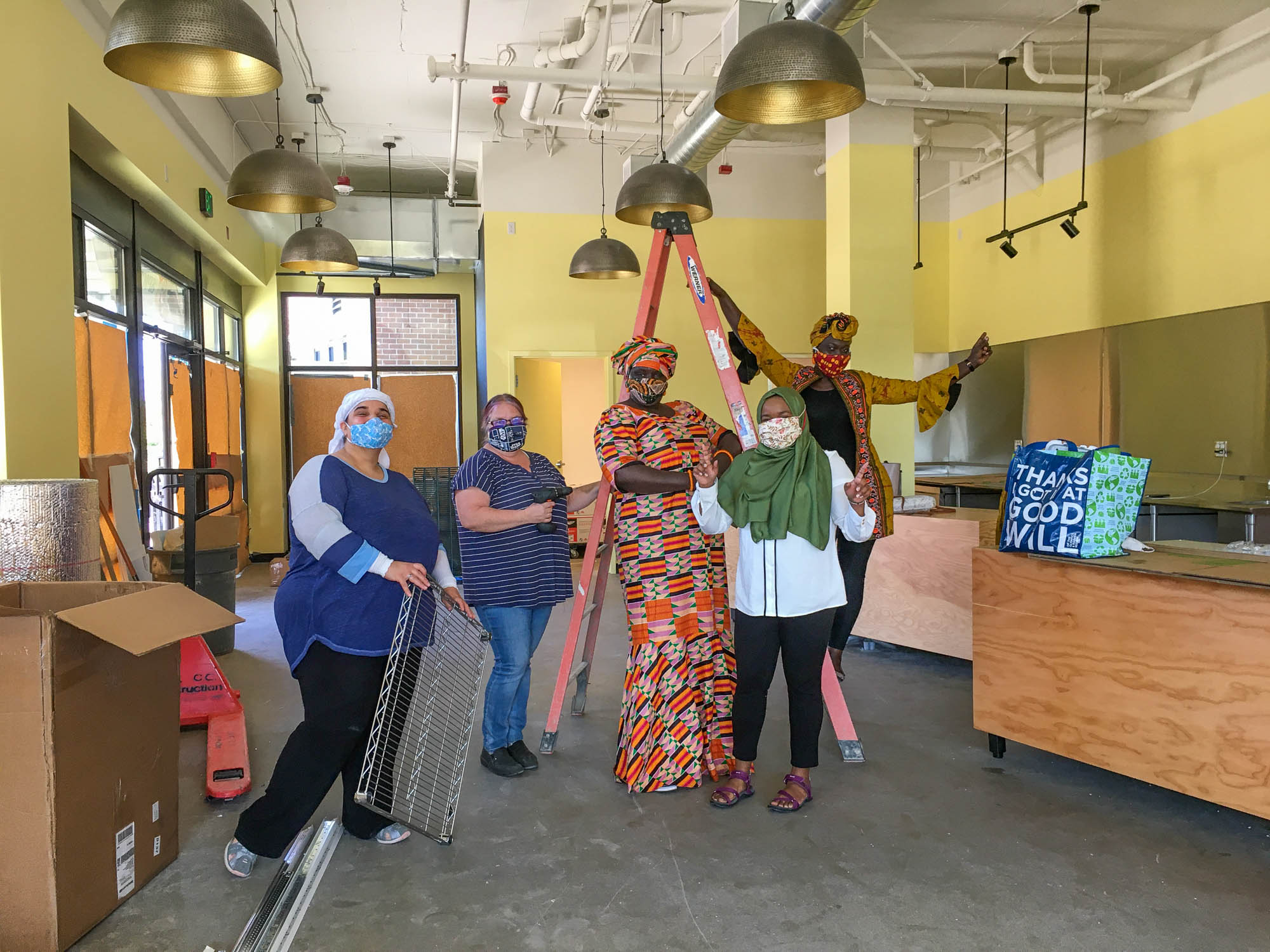
When we started planning this years ago, we were not in a pandemic. We began working with aspiring entrepreneurs to create a space that was inclusive, provided economic opportunity, and offered community connections. Spice Bridge opened in September 2020 and was ready to meet the changing needs of the food industry to support the Incubator businesses and also address the rising need families and seniors were facing to put culturally relevant meals on the table.
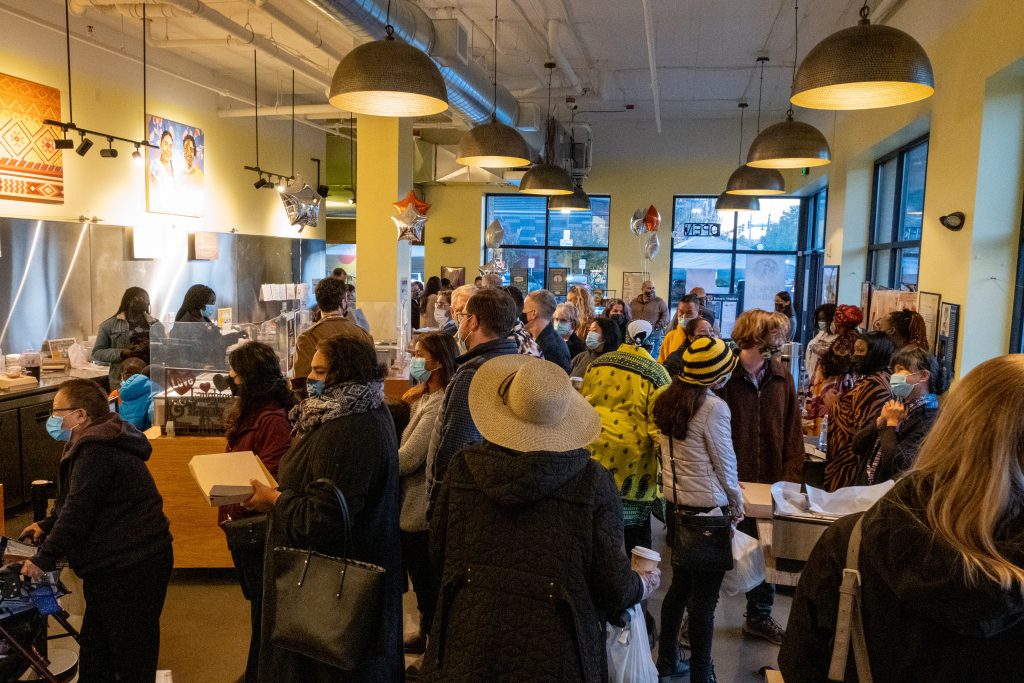
Now, in 2022, we are excited to onboard new businesses into the Food Business Incubator program, support the current cohort as they grow and scale, and expand our community meal program to provide over 250 meals a week along with Tukwila Village Farmers Market. This is ALL possible through Spice Bridge being a reality. From the bottom of our hearts, THANK YOU for helping us build our new home! Food is Love!
With gratitude,
Kara Martin - Food Innovation Network Program Director
A.J. McClure - Global To Local Executive Director
Spice Bridge in the News
Spice Bridge chefs have stirred up a lot of interest from news media! Here are some featured stories:
- Spice Bridge offers global flavors that are 'so frickin' good' KNKX Public Radio
- For two women small business owners, Ramadan is a moment to remember home from the South Seattle Emerald
- Seattle’s Spice Bridge Food Hall Links Immigrant Cuisine To Local Community from Forbes
- Congolese chef shares heritage through cooking from KIRO 7 News (video)
- In Seattle, a Taste of Home and a Business Opportunity from Whetstone
- Explore Delicious Global Cuisines at Spice Bridge Food Hall from ParentMap
- Local Food Systems Key to Healthy, Resilient, Equitable Communities from Planning (video)
- Immigrant and refugee chefs make meals for their elderly neighbors from KIRO 7 News (video)
- Spice Bridge food hall brings global cultures & cuisines together in Tukwila from Seattle Refined
- What To Eat At Spice Bridge, A New Food Hall In Tukwila from The Infatuation
- Lumpia, beignets and more: At Tukwila’s Spice Bridge Food Hall, women turn restaurant-owning dreams into reality from the Seattle Times (see a PDF of the print version here)
- Tukwila's global food hall helps women of color, refugees start (& grow) their businesses from Seattle Refined (video)
- Immigrant Cuisine As Cultural Connection At Seattle’s Spice Bridge from Zagat
- This Tukwila food hall supports immigrants' small businesses from KING 5 Evening (video)
- A new global food hall in South King County opens up opportunities for women immigrant and refugee chefs from the International Examiner
- Spice Bridge from Runta News (video)
- Tukwila’s Spice Bridge serves global cuisine cooked by immigrant, refugee women entrepreneurs from KIRO 97.3 (audio)
- New Tukwila food hall opens, featuring global eats from KUOW (audio)
- Spice Bridge: The New Food Hall for Adventurous Eaters from Red Tricycle
- Food hall opens in Tukwila offering cuisine from throughout the world from the South Seattle Emerald
- New Tukwila Food Hall Opens Tuesday, Featuring Immigrant and Refugee Businesses from Seattle Eater
We'll add more stories as they are published. Sign up for FIN’s newsletter and follow Spice Bridge’s Facebook and Instagram channels to keep up with the latest news!
Pop-ups at Spice Bridge
While Jazze's is temporarily closed from Feb. 4 through Mar. 5 for family reasons, a great lineup of global food businesses will hold pop-ups at their stall. Come by Spice Bridge to enjoy even more flavors from around the world:
Thursday, Feb. 4—WUHA Ethiopian-American Cuisine
Saturday, Feb. 6—Seatango
Friday, Feb. 12—Mamá Tila
Saturday, Feb. 13—Seatango
Friday, Feb. 19—Mamá Tila
Saturday, Feb. 20—Monique’s Hot Kitchen
Friday, Feb. 26—Mamá Tila
Saturday, Feb. 27—Monique’s Hot Kitchen
Friday, Mar. 5—Mamá Tila
We expect to add more vendors to the schedule, so please check back often!
Meet Theary Cambodian Foods Owner Theary Ngeth
We’re excited to introduce you to the vendors who offer cuisines from around the world at Spice Bridge! Today we’d like for you to meet the owner of Theary Cambodian Foods.
Theary Ngeth launched Theary Cambodian Foods in October to provide comfort and connection for her fellow Cambodians, and to preserve and share her cultural food traditions.
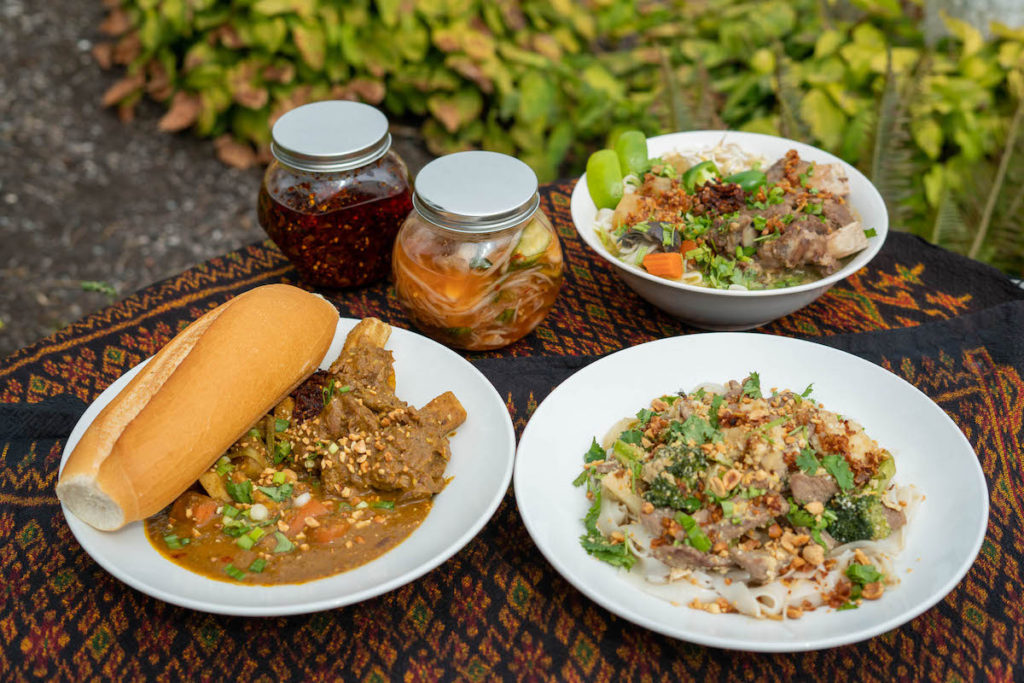
When Theary was 5 years old, she and her family escaped the Khmer Rouge on foot, making a dangerous journey through the jungle from Cambodia to Thailand. They were among thousands of Cambodians who fled genocide, survived brutal conditions in refugee camps, and eventually resettled in the United States. These refugees endured many losses, including important parts of their culinary heritage.
“So many Cambodian recipes, traditionally passed down orally from parents to children, went to the grave during the Khmer Rouge," Theary said. Her mother and other survivors kept many Cambodian cooking traditions alive, but Theary sees them fading as her parents' generation passes away.
"We are losing our authentic flavors and our techniques, because elders hold the knowledge of how our dishes are made and how exactly they should taste. You can't learn this from a book or from YouTube—it has to happen in person. It's a process of tasting and adjusting. I'm grateful I experienced my mom's food and learned so many cooking secrets from her,” she said.
Theary became passionate about cooking after her childhood friend recruited her to prepare meals for a group of Cambodian seniors in the Seattle area.
“The seniors say, ‘I've been looking for this flavor for a long time, and you’re the only person who has made this the way I remember it. This dish reminds me of 1971, before the Khmer Rouge.’ That keeps me motivated to keep this food tradition alive. These are the healthy foods of our ancestors,” Theary said. "Some of my people won’t or can’t go back to Cambodia. But they can have the food experience at my kiosk."
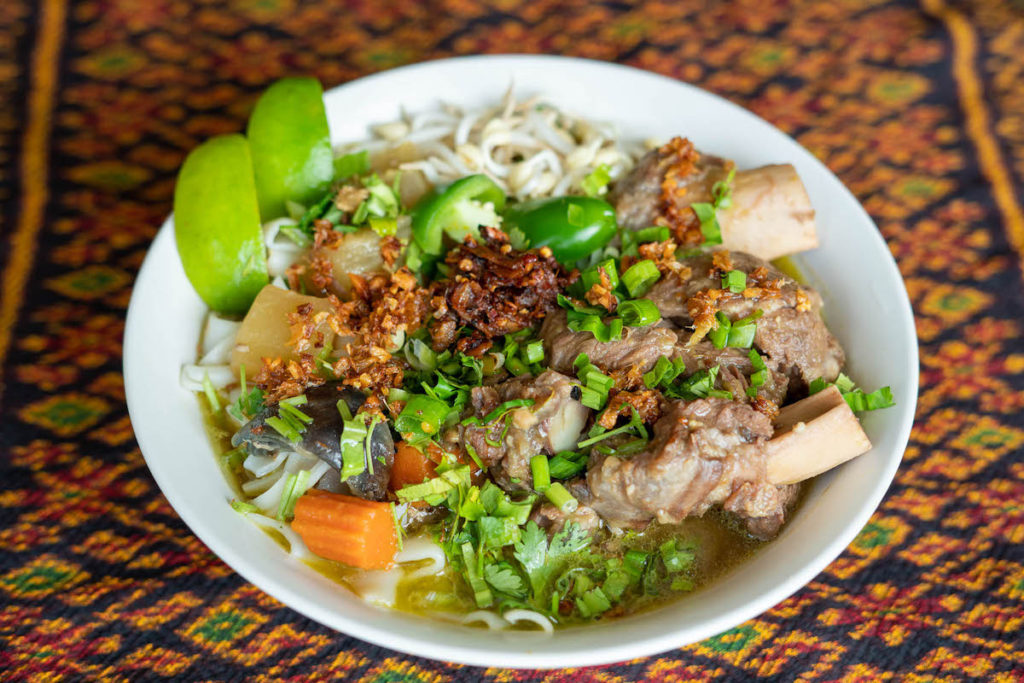
Read our Q&A with Theary to learn about traditional Cambodian cuisine, how she learned to cook, and more.
Please tell us about Cambodian food.
Our food is special because these foods are passed down through generations. There hasn’t been a lot of modern medicine in the country, but we have these ancestral, ancient ways of eating for our health. For example, we use galangal and garlic to help lower blood pressure. And the way we balance our dishes—the combination of carbs, vegetables, and herbs—it’s good for digestion.
Our baseline of our food starts out from fresh nature. At the heart of it is a paste called kroeung made from fresh lemongrass, kaffir leaves, turmeric, garlic, and galangal. Many people who think of lemongrass think of it as a scent or a tea, but they don’t think about eating it in soups and other meals. I slice the grass stem thin and smash it to release the oils, make it into a paste, so you get a wonderful aroma. This is the traditional way—no blending, because we didn’t have blenders. When I heat up the oil and add kroeung, it creates a great aroma that fills up the room.
Cambodian food is all about caramelization, and each person adding the toppings they want to get the right balance of salty and sweet. Take fried rice for example. It’s steamed rice with the kroeung paste. Then you top it with caramelized garlic, sliced ginger, and sauce, and you get so many layers of interest. It’s so attractive to your eyes, and nose, and mouth.
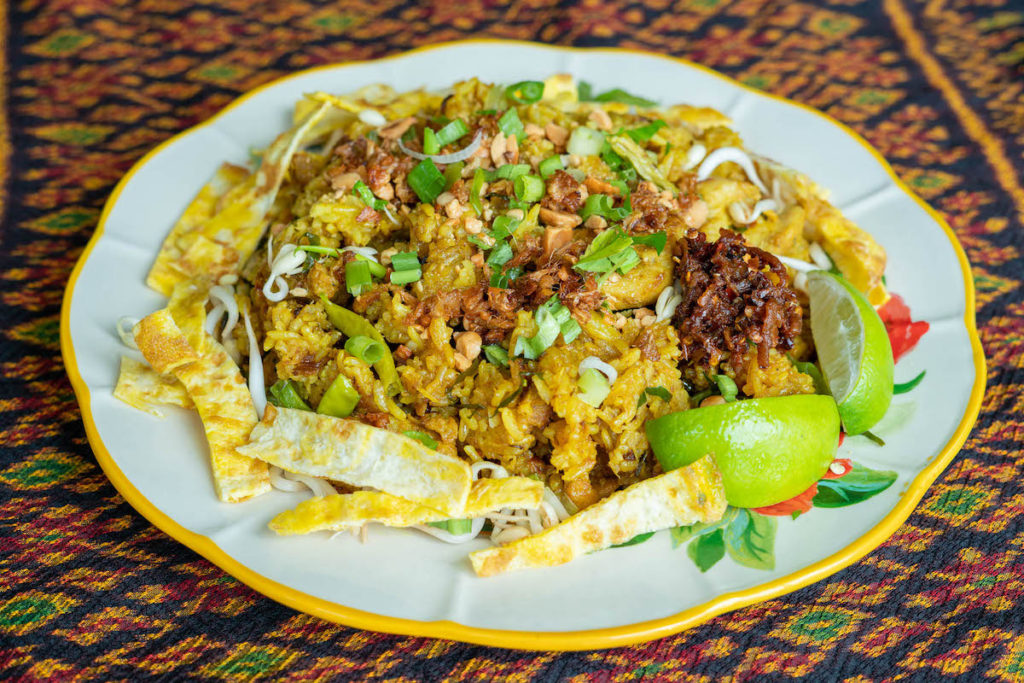
How did you learn to cook?
My mom was a chef. I didn’t like cooking because growing up I wanted more of my mom’s time, and it was always taken away from me when she was cooking for everyone. Same with my dad—he was a Buddhist priest, so their professions took them away from me. I didn't like how much time my mom spent cooking. When she cooked for the community center, for friends, I walked away. But I looked at what she had on the counter, and I noted all of it, took a photo in my mind of all the ingredients.
After my mom died, my childhood friend recruited me to cook for Khmer seniors to carry on the legacy my parents started in the late 80's to mid 90's. He wanted the Khmer seniors to have a place to go and socialize, and most important to enjoy the authentic Khmer foods that they loved when my parents were cooking for them. I still didn’t like cooking, but the seniors were saying that they liked my food, and it tasted like my mom’s, and reminded them of my mom, and they missed her. They said when they see me, it’s like seeing my mother, and it makes them happy. So I felt a commitment. And then I started to love cooking. What I love most about being a chef is being able to deliver happy moments and happy memories—being able to create that, so the rest of their day they feel happy and have memories of their family life.
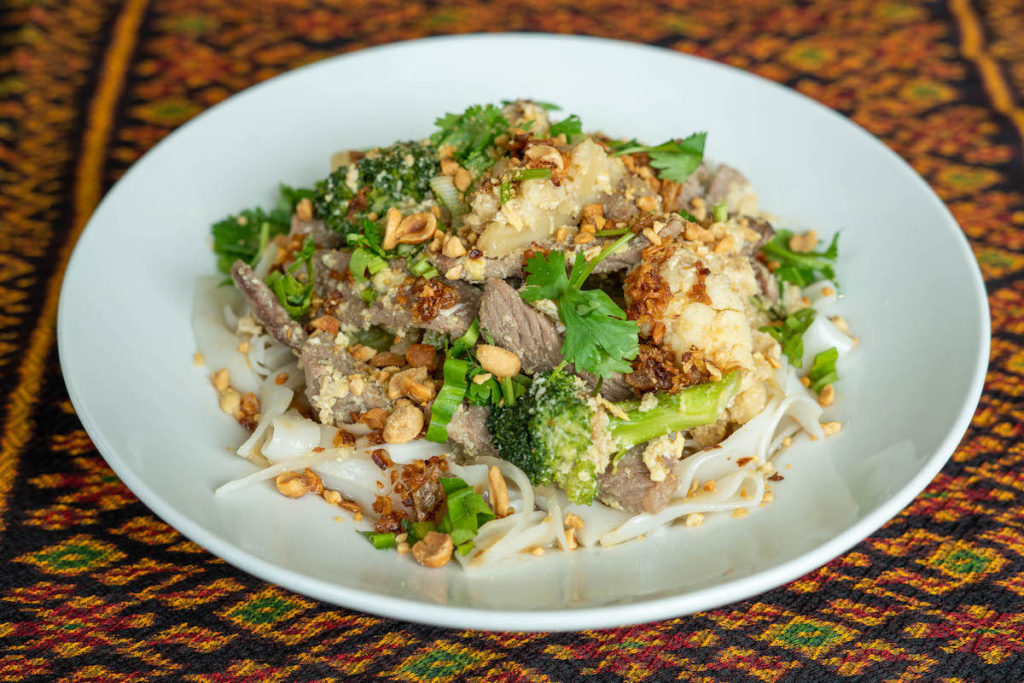
Tell us about starting your business, Theary Cambodian Foods.
Cooking at the community center helped me practice cooking in a commercial atmosphere, cooking for big crowds. I learned how to move and make things fast and in an authentic way.
I knew I wanted to have my own food business, but I didn’t know how to do it. I didn’t have the direction or the resources. My friend Liyu [now the owner of WUHA Ethiopian-American Cuisine] was at my house eating my chili oil, and she loved it. She said it had to be in stores and restaurants. She also told me about FIN. I joined FIN and took business classes with Ventures.
Before Spice Bridge, it was just my home kitchen, a few friends in my living room. I couldn’t see where my food could go. Now I see how it can go to be shared around the world. I’m ready! I feel excited, happy, ready.
Maybe my mom is looking out for me—it’s like she said, “Let's get you into cooking! And here’s your friend Liyu, and she’ll introduce you to FIN.”
My mom wanted to start a restaurant, but didn’t have the resources. Now I feel her dreams will be accomplished through me.
Visit Spice Bridge
Come by Spice Bridge to experience cuisine from Theary Cambodian Foods and other rotating vendors. We have takeout and outdoor dining available, and some vendors offer delivery options. See our full schedule.
Theary Cambodian Foods is open at Spice Bridge on Thursdays, Fridays, and Saturdays from 11 a.m. to 8 p.m
Contact Theary Cambodian Foods
- Website: theary-cambodian-foods.square.site
- Instagram: @ThearyCambodianFoods
- Facebook: @ThearyCambodianFoods
- Email: ThearyCambodianFoods@gmail.com
- Phone: (206) 201-9995

KIRO 7 spotlights chefs who have cooked up 8,000 no-cost meals for neighbors
KIRO 7 News just spotlighted the wonderful Food Business Incubator participants who launched our no-cost meals program!
When Lilian Ryland and her fellow chefs saw neighbors in need of healthy food at the start of the pandemic, they got to work in the kitchen. Since March, they have shared their time and talents to prepare more than 8,000 delicious meals for isolated seniors and families.
We’re grateful to everyone who's joined this effort to provide meals and connection to our community—and there are many people to thank!
Kitchen superstars
Our chefs and meal packers have included Naija Buka owner Lilian Ryland; Mamá Tila owner Ofelia Anorve; Monique’s Hot Kitchen owner Monica Wachira; Seatango owners Monica Di Bartolomeo and Ariel Firpo; Soozveen Mediterranean Catering owners Sheelan and Zozan Shamdeen; Theary Cambodian Foods owner Theary Ngeth; WUHA Ethiopian-American Cuisine owner Liyu Yirdaw; Moyo Kitchen owners Mwana Moyo and Batulo Nuh; Wengay’s Kitchen owner Krizia Cherece; Jazze’s owner Nasrin Noori; Chef Jalissa Culinary Co. owner Jalissa Horton; FIN Steering Committee members Ehler Win and Anna Kitchin; and Global to Local staff members who went above and beyond to support this program.
Amazing partners and contributors
Our partners at IRC's New Roots program contributed fresh produce that's delivered to seniors along with the meals.
Meals have been distributed by partners including Catholic Community Services; the City of SeaTac Senior Program; Somali Youth & Family Club; Congolese Integration Network; Somali Health Board; and Living Well Kent.
The program has been supported by funding from the American Heart Association, the CARES Act, and dozens of community members who contributed to our crowdfunding campaign. We also received generous in-kind donations from Tilth Alliance; Project Feast; Macrina Bakery; Des Moines Area Food Bank; Food Lifeline; The Storehouse Covington Food Bank; Cheri Mayer; Kerrie Carbary; and caring neighbors.
Feeling inspired? Join us!
Consider contributing to our capital campaign for Spice Bridge, the commercial kitchen and food hall that makes all of our work possible. With your support, Spice Bridge will continue to be a place where we meet food access needs, celebrate diverse cultures, and help talented chefs turn their business dreams into reality.
Order holiday meals and treats for carryout from Spice Bridge
Start new holiday traditions with FIN food businesses this season—and get your orders in soon! All orders can be picked up from Spice Bridge. Check out holiday specials from each business:
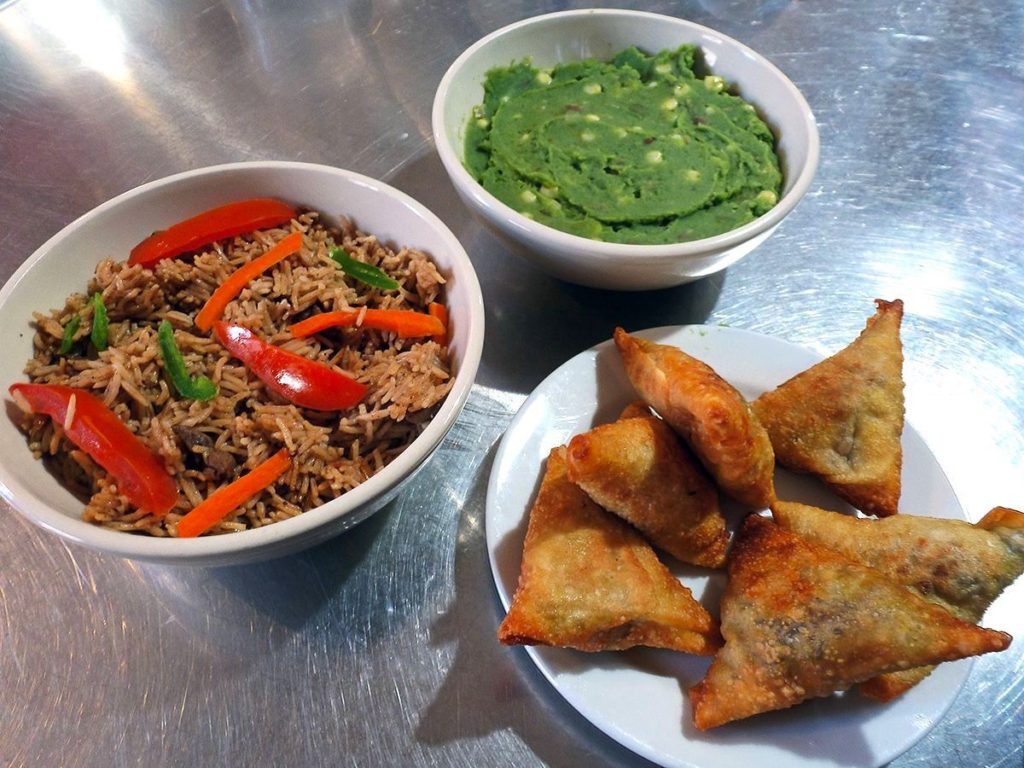
Monique’s Hot Kitchen is offering special Kenyan meal pickups on Sunday afternoons in December. Choose from:
- Beef pilau rice: family size (feeds 5+ people) for $89.95 or individual portion for $17.99
- Spicy bhajia, an East African-style fritter: family size for $79.95 or individual portion for $15.99
- Mukimo, mashed potato with pumpkin leaf greens and corn: family size for $89.95 or individual portion for $17.99
- Spicy beef or veggie samosa: 12 pieces for $30 or $3 each piece
Pickup is on Sundays from 3:45-6:45pm. Please order at least 48 hours ahead online, or by calling Monica at 206-460-8536 or emailing moniqueshotkitchen@gmail.com
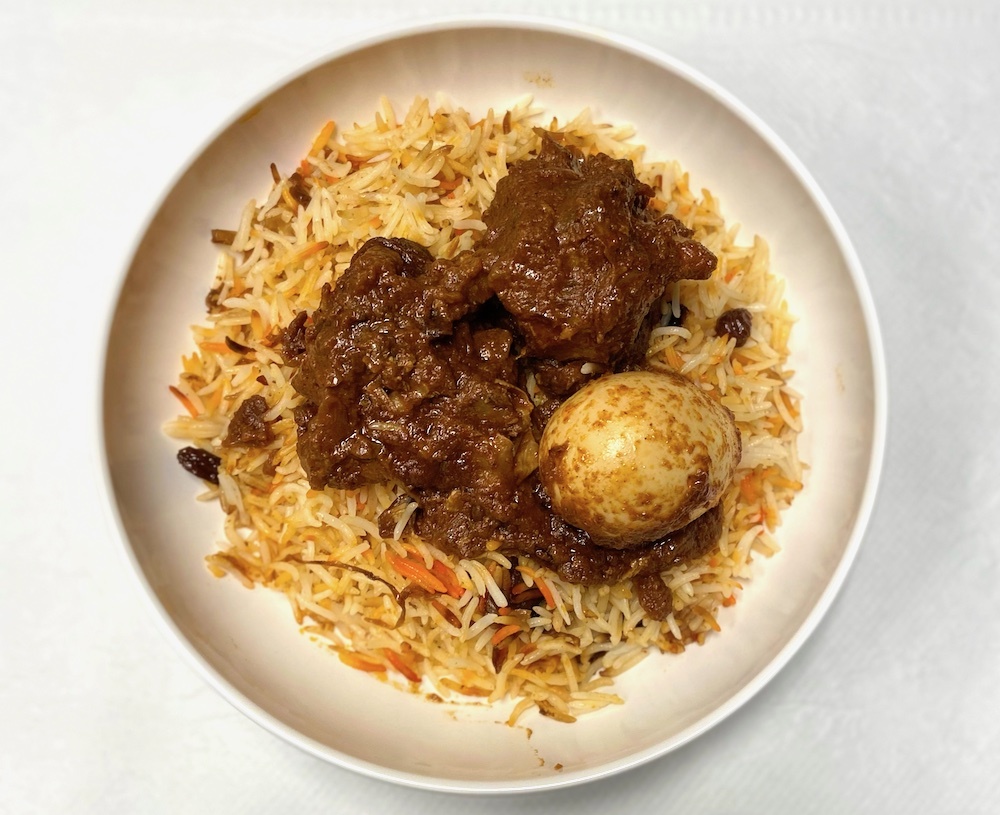
Moyo Kitchen is preparing a Swahili spiced biryani rice dish that serves a family of five every Friday in December, including Christmas Day. Choose from goat ($95), chicken ($70), or beef ($75). Please order at least one week in advance by emailing moyokitchen20@gmail.com, or calling or texting 206- 227-0442. (Pro tip: If you're looking for something sweet, ask Moyo Kitchen about their Swahili treats!)

Naija Buka is offering a variety of Nigerian foods including plantains, meat pies, and yam cubes! They're all frozen, and are available for pickup or shipping. Visit Naija Buka’s website to start your order.

Seatango is baking an amazing array of boxed goods:
- Cupcakes - vanilla/lemon cupcakes with dulce de leche filling covered with vanilla icing and holiday decorations, and chocolate/orange cupcakes with strawberry filling covered with chocolate icing and winter decorations: $12 for four cupcakes (two of each kind) or $32 for 12 cupcakes (six of each kind)
- Assorted holiday cookies: $28 for 12
- Alfajores: $12 for four (one coconut, one powdered sugar, one white chocolate, one dark chocolate)
- Mini pastafrola: $12 for two (one quince, one sweet potato)
- Deluxe box: $60 for 12 assorted holiday cookies; two mini pastafrola (quince and sweet potato); four alfajores (white chocolate, dark chocolate, powdered sugar, coconut); and four cupcakes (two vanilla/lemon with dulce de leche filling and vanilla icing, two chocolate/orange with strawberry filling and chocolate icing)
- Savory empanadas - choose from an assorted box (three beef, three chicken, three corn, three spinach) or a vegetarian box (six spinach, six corn): $30 for 12
Call 425-614-7892 or email monica@seatangofoods.com to order, and please order at least three days in advance.
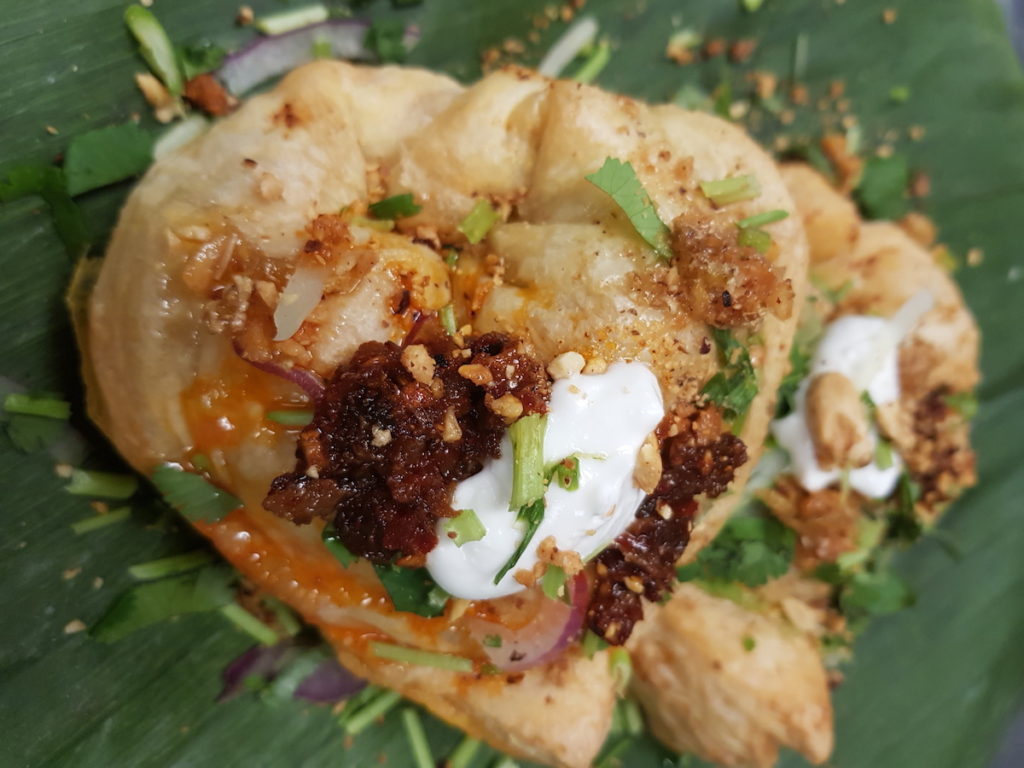
Theary Cambodian Foods is cooking up two holiday specials! Their $100 combination platter includes five spicy stuffed chicken wings, five large full chicken wings, five baked spicy chicken patties, five beef back ribs, and a pickled veggie salad topped with herbs, chili oil paste, and fried ginger and garlic. Their $42 Noumm Ka Ri plate includes 13 pastries stuffed with your choice of chicken or beef and topped with herbs, nuts, coconut cream, and Theary’s chili oil paste. Theary is taking pre-orders now through midnight on Dec. 22. Platters will be available for pickup on Dec. 23 from 5-8pm, and Dec. 24 from 11am-4pm. Order online, email thearycambodianfoods@gmail.com, or text 206-201-9995.
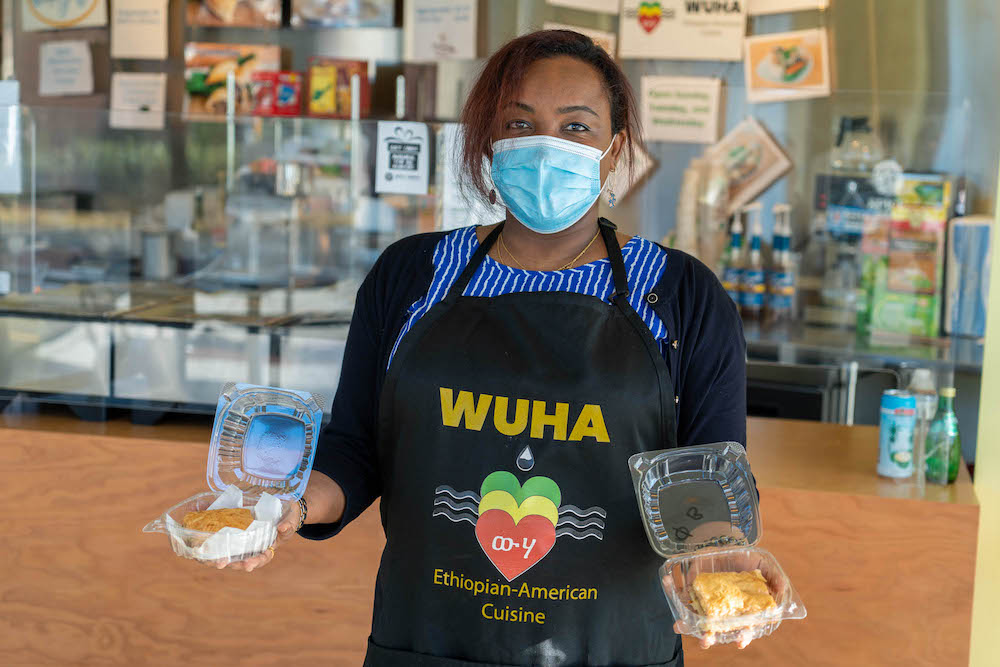
WUHA Ethiopian-American Cuisine is putting together special holiday boxes of their famous baklava. Choose from: vegan baklava made with coconut butter, pistachios and walnuts; nut-free baklava made with roasted sunflower seeds, coconut flakes, and raisins; or original baklava made with pistachios, walnuts, and butter. To order your $22 box of six baklava by Dec. 20, please call Liyu at 425-243-3553.

Wengay's Kitchen has holiday assortments of authentic Filipino baked goods. To ask questions or start your order, please message Wengay's Kitchen on Facebook or Instagram. They will accept orders until Friday, Dec. 18, and the baskets will be available starting Sunday, Dec. 20. Choose from a variety of treats to put together a basket for $35 or more:
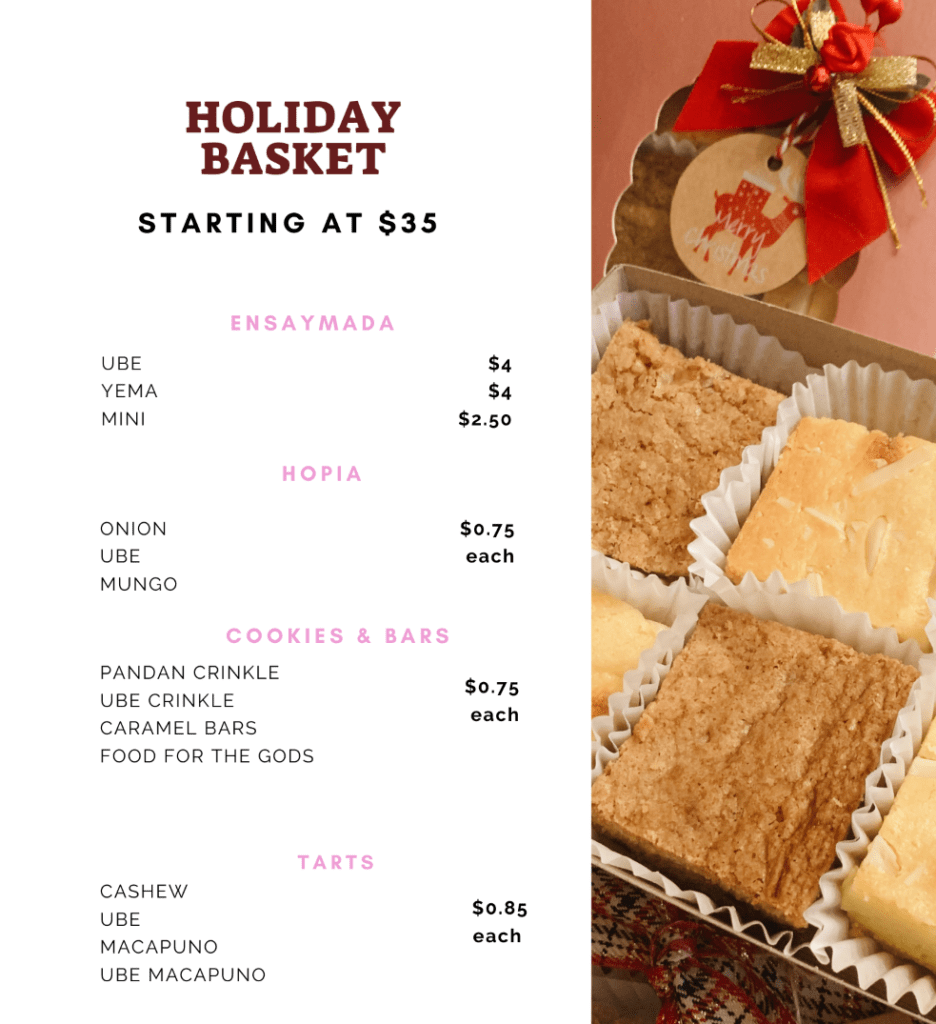
Purchase gift cards for everyone on your list—from the comfort of your smartphone or computer!
Spice Bridge vendors offer digital gift cards! Order yours today from Afella Jollof Catering, Jazze's, Moyo Kitchen, Seatango, Taste of Congo, Theary Cambodian Foods, Wengay's Kitchen, and WUHA Ethiopian-American Cuisine.
Meet Liyu Yirdaw, owner of WUHA Ethiopian-American Cuisine
We’re excited to introduce you to the businesses that offer cuisines from around the world at Spice Bridge, our new food hall! Today we’d like for you to meet the owner of WUHA Ethiopian-American Cuisine.
Growing up in Ethiopia’s capital city, Addis Ababa, Liyu Yirdaw loved to spend time with her mom in the kitchen.
“Everything she cooked has always had an exciting and wonderful taste to it,” Liyu said.
Inspired to study western cooking at culinary school, Liyu graduated at the top of her class. When she came to the United States 15 years ago, she was thrilled by the variety of different ethnic foods she found, and began experimenting with different flavor combinations.
“Food is an art for me, and I like to create mouthwatering bites by mixing flavors, spices, and herbs from different cultures, and also recreating dishes by adding or substituting ingredients,” Liyu said.
Liyu launched WUHA in October to offer a unique blend of Ethiopian and American foods, served more quickly than a typical Ethiopian restaurant meal.
We spoke with Liyu about her Spice Bridge menu, the meaning of “WUHA,” and her big plans for the business. Read our Q&A to learn more about this dynamic entrepreneur!
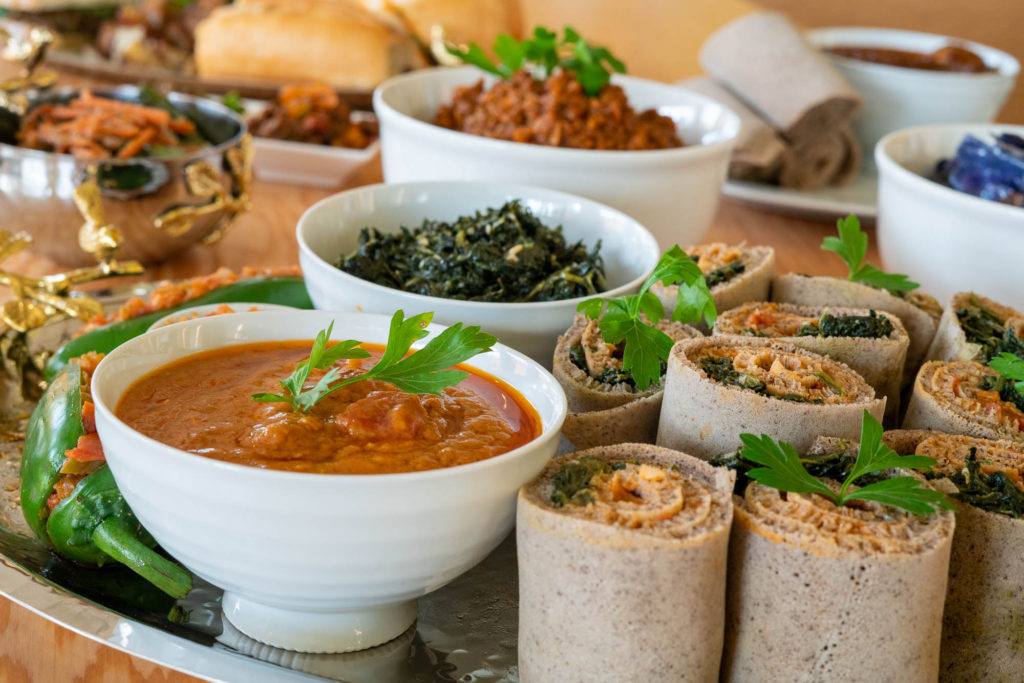
Please tell us about your business.
I offer customized food for people who have never eaten Ethiopian food before, people who like to experience new flavors, curious foodies, and for those who are used to eating American food and ready for a different take on it. We bring those two cultures together and let them inspire each other to complement one another. We also minimized some of the spiciness out of the Ethiopian food without sacrificing the taste of the food, sometimes just by simply cooking it longer. If people want to try Ethiopian food, but they aren’t ready for the full burst of flavors, then they can taste this. It’s not too spicy, but it’s spicy enough for it to be distinctively Ethiopian.
It’s also a fast experience. Most of the time when you go to an Ethiopian restaurant, there is a long waiting time, but we have quicker service. You can get in and get out quicker. Which makes it ideal for people who are short on time and want to grab and go. We also designed our menu items portion for 1-2 person servings which makes it convenient for solo dinners or for people who like to come in a group of two or more, as it allows everyone to have their own food, plate or to-go box, to eat out of. This also makes it safer and convenient for customers to stay in compliance with current COVID-19 guidelines. The portion size also makes it possible for people to eat and finish their food in one sitting instead of having leftovers, and carrying it around with their car smelling like food.
What makes your cuisine special?
What makes my cuisine special is that I cook it as if I would cook it for my family: with great care and love. If you like spicy food, but not too spicy, then you will get that taste in my cuisine. We serve both vegetarian and meat lovers, wheat and gluten-free injera, dessert with nuts, without nuts, and without butter, so everyone is welcome to come get the full taste without sacrificing the taste or flavors of the food.
We always go for the healthier version of everything—heart-healthy food with less fat. I use healthy oils like olive, grapeseed oil, or coconut oil depending on the food. I’m also trying to help people add vegetables to their diet. And we won’t sell things with too much sugar. We’re not planning to serve sodas; we have bottled water, coconut water and carbonated mineral water focusing on hydration and digestion, because we want to introduce healthy options.
Can you describe some dishes you offer at Spice Bridge?
We have beef and vegetarian injera rolls; injera is an Ethiopian flatbread, and I roll it with meat, vegetables, and sauces I make from scratch.
Our beef roast sandwich with an Ethiopian twist, served with oven roasted potatoes, is very popular.
We also have our already-famous dessert, WUHA’s baklava, made in house with an option of with nuts, without nuts, and with no butter for vegans.
We’re also planning all-day breakfast days, with both American food like pancakes and Ethiopian food like ful—and we’ll present things in a way that you wouldn’t expect.
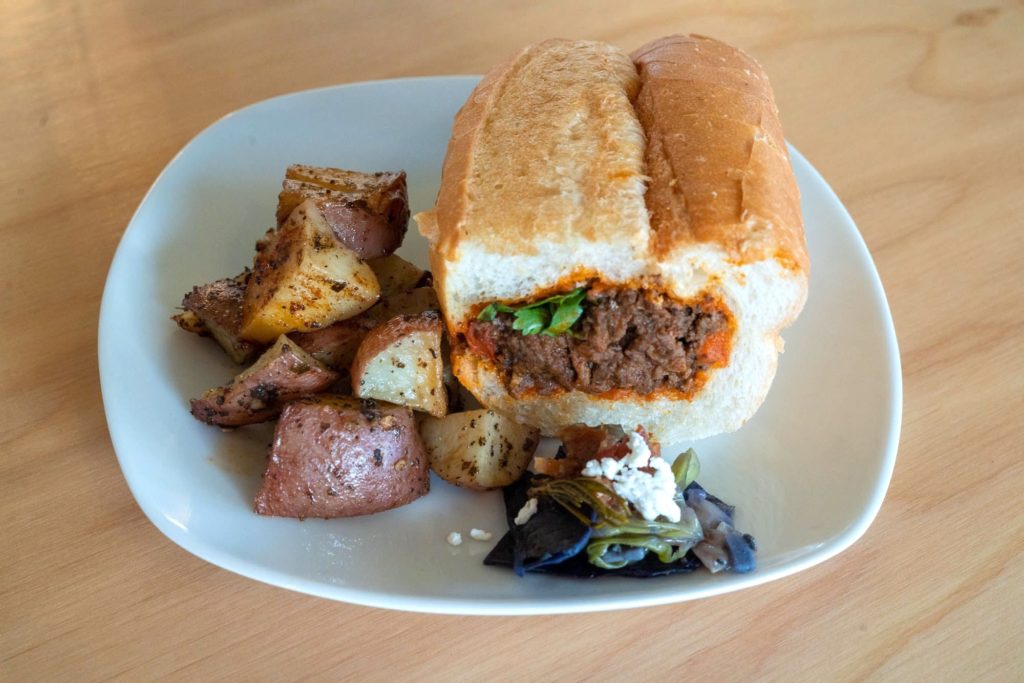
How did you choose your business name?
“Wuha” means “water” in Amharic, which is the national language of Ethiopia. Water is life. A person can live long without food, but cannot live without water more than a couple of days as more than 60 percent of the human body is water. Water is for everyone, and I want my food to be like that—I want for everyone to love and enjoy it. I want WUHA and its future products to go worldwide, and that’s how and why I named my business WUHA.
What challenges have you encountered trying to establish your business, and how have you overcome those challenges?
I’ve always wanted to have a food business, but I was afraid. When you have a food business, there is more to it than just cooking. There is accounting, managing your budget and people, menu making, logo and business card designing, licensing, state and city regulations and guidelines to follow and so much more to the business. Also, at the beginning, I started with a partner who couldn’t be in the business anymore for a variety of reasons. It was sad for me, and hard to lose my partner. And I went from sharing responsibilities to having to do everything as one owner.
COVID has also been a big challenge. For one thing, the way we think about food businesses changed. Also, I am a nurse, and I had to adjust with that work.
My focus shifted, but I’m back on track now. Being with FIN, I am really hopeful and I believe I will get there with no problem because I’m working with a group of people who want me to succeed, and who are there for me. The FIN staff have helped me, keeping me on track and focused. When I have a question or something is hard, I have someone to ask, and someone who can share ideas and consult.
What is your dream for your business?
Opening at Spice Bridge is a first step for me, and I have big plans for WUHA. This is the beginning of it—my plan is to expand and franchise WUHA around the world. I also want to start packaging foods. I want people to find my food in every grocery store so they can heat it up and enjoy it anytime at home. I want it to be accessible. I also want to start our WUHA’s mixed spices line for people who want to try and cook my food at home.
Is there anything else you want people to know?
The main ingredient in my food is love. I love my mom’s food, and I especially want to eat it after a long day. All I want to do is go home and eat my mom’s food, dine with my parents. I think a lot of people can relate to that, and I want people to get that warm feeling when they eat my food. When they come, I want them to not only get that good food, but to also to feel loved and taken care of and to feel the good energy that they could feed off of. I want my food and my service to make their day and give them the comfort they need—that’s very important to me. I’m coming from a really good place, and I want to deliver that feeling to people. I want them to have an unforgettable great experience.
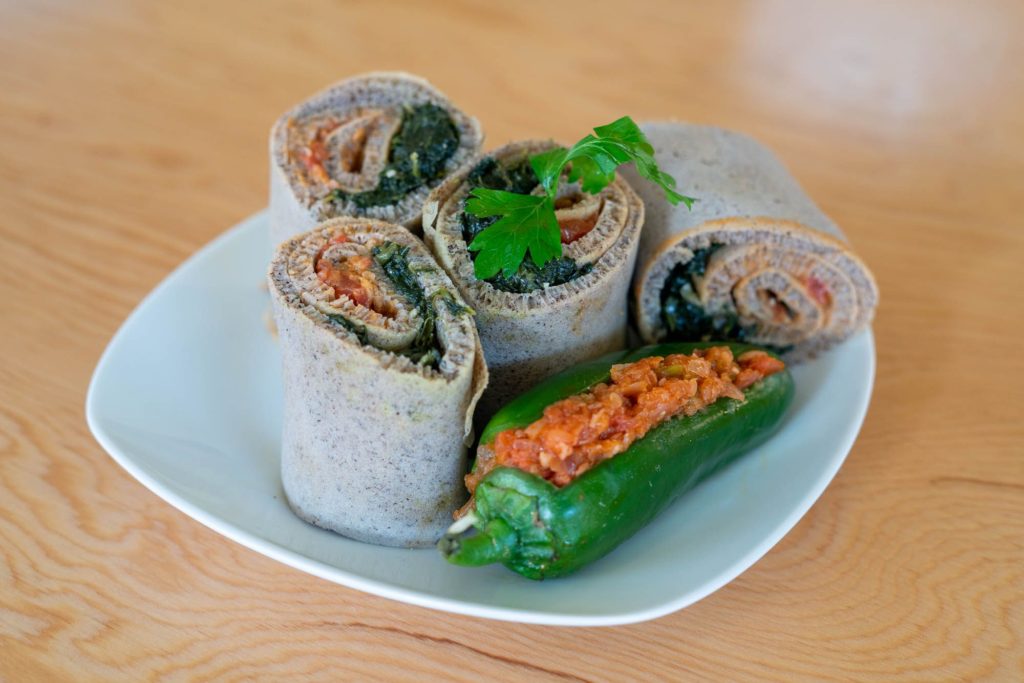
Visit Spice Bridge
Come by Spice Bridge to experience food from WUHA and other rotating vendors. We have takeout and outdoor dining available, and we’re also working on delivery options—stay tuned!
WUHA is open at Spice Bridge on Tuesdays and Wednesdays from 11 a.m. to 8 p.m., and on Sundays from 10 a.m. to 5 p.m.
Contact WUHA
- Website: wuhacuisine.square.site
- Email: wuha.ethiopian.cuisine@gmail.com
- Phone: (206) 474-0898
- Facebook: @WUHAcuisine
- Instagram: @WUHAcuisine

Meet Jazze’s owner Nasrin Noori
We’re excited to introduce you to the businesses that offer cuisines from around the world at Spice Bridge, our new food hall! Today we’d like for you to meet the owner of Jazze’s.
Since she was a young girl growing up in Afghanistan, Nasrin Noori loved being in the kitchen, where she would challenge herself to craft delicious meals from limited ingredients. Nasrin moved to the U.S. with her family at age 11, and by the time she was a teenager, relatives and friends knew how creative she was in the kitchen. They enlisted her help cooking for big events, and Nasrin was also responsible for preparing dinners for her family of 10.
In her late teens, Nasrin became interested in nutrition, and started learning about the U.S. food system and the benefits of organic foods. She got certified as a health coach, and eventually opened Jazze’s to offer healthy Afghan fusion food prepared with organic, local ingredients. Her menu caters to a variety of dietary needs and preferences, and includes paleo, vegan, and gluten-free options.
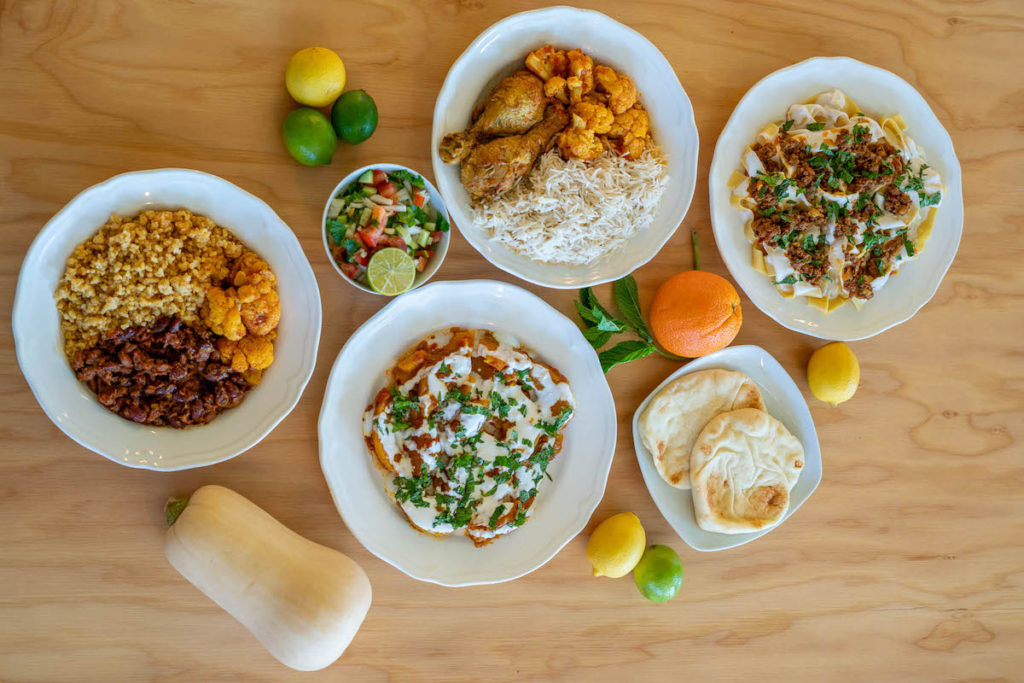
Read our Q&A with Nasrin to learn about her seasonal menu, how she balances raising four children with starting a new business, and her dreams for Jazze’s.
How did you choose "Jazze's" for your business name?
Picking the name for my business was probably the easiest part of becoming an entrepreneur. My children are my number one inspiration for most things that I do. I’m a blessed mother to four incredible little people. My oldest son's initials are J.A., my second son's is Z., my daughter's is also Z., and my youngest son's is E. All their initials combined creates Jazze’s.
Can you describe your cultural heritage and how it influences Jazze's cuisine? What elements of Afghan cuisine are incorporated into your menu?
I would say that my cultural heritage is Muslim-Afghan-American. The biggest part of my Afghan roots is the food. Afghan food has been a central part of my upbringing regardless of where we've lived—the food was a consistent part of my life. We moved to the States before my 12th birthday. I've lived more than half my life in the States, but my connection to Afghan food is very much a big part of my life still.
When I look at my children, their only connection to their Afghan side is the food and hospitality of Afghan culture. Food is a way that my children are learning about my upbringing and my childhood, and they compare it to that of their father, who's African-American. The kitchen is a big part of our family's connection; both my husband and I are somewhat foodies, and we are very much health-conscious individuals. We care about what we put in our body and what we bring in our home to feed our family, and this same care goes into what we offer at Jazze's.
A lot of different elements of Afghan cuisine are incorporated at Jazze's, but one of the most important elements for me is offering a seasonal menu. This is how Afghans traditionally prepared meals and dishes—based on what was available during that season. For the past 20 years, I've been learning about health and nutrition and how it impacts your mental and physical wellbeing, and as a certified health coach I understand the importance of eating clean, fresh, and seasonal.
Please describe a couple of the dishes you offer at Spice Bridge.
Kabili Pilau is probably one of the best known Afghan dishes. Some may even say it’s the national dish of Afghanistan. It’s long grain rice served with lamb or chicken and topped with carrots, raisins, and cardamom spice. I jazz this dish up a bit by adding almonds, pistachios, cranberries, and fresh orange zest. It’s been a favorite in my home for many years, especially in the fall months with all the beautiful fall colors topped on the lamb and rice. It’s been a tradition at our Thanksgiving dinner.
Burani Kadu is squash with yogurt. This is a very much a seasonal dish, as are most Afghan dishes. This dish can be made with any variety of squash. The squash is cooked in a delicious onion, garlic, and tomato sauce and topped with a garlic yogurt sauce, garnished with mint. Burani can be served with warm bread or rice.
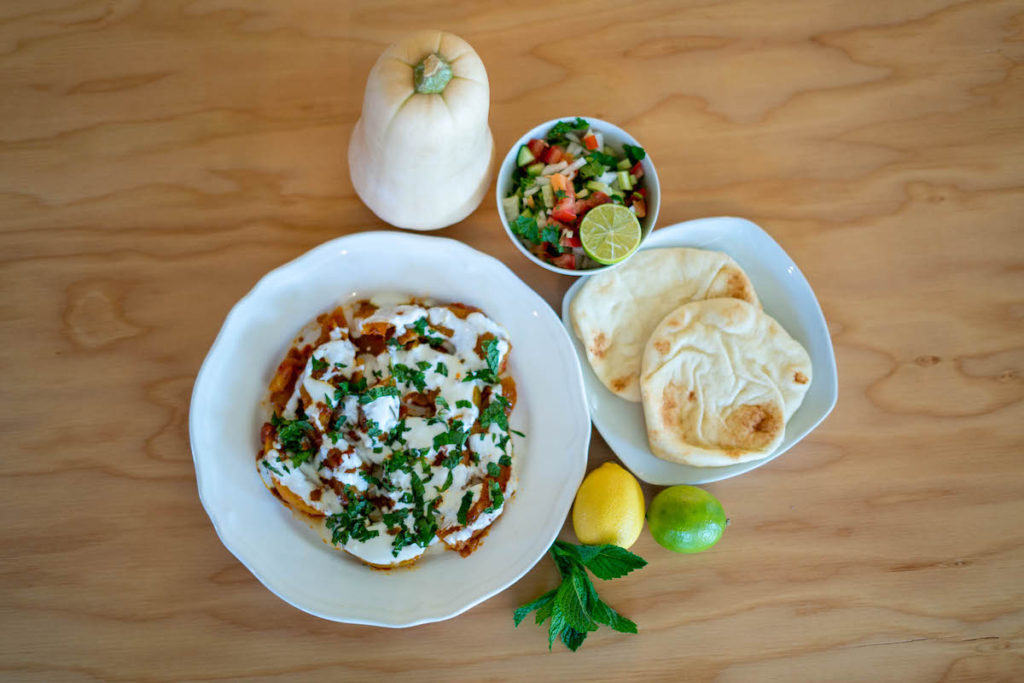
What challenges have you encountered trying to establish your business? How have you overcome those challenges?
I would say enough time, enough finances, not having any prior knowledge of running a business and an up-to-date knowledge of technology are a few of the challenges. I’m not sure if I have overcome any of them completely—it’s work in progress and a lot of trial and error. I think that in today’s society, time is a constant balancing act, especially when you are a parent. For the rest of the challenges I’m incredibly blessed to have FIN on my side. The amazing individuals at FIN, who all go above and beyond their job titles and wear multiple hats to help me achieve my goals, and dreams of being a successful entrepreneur.
What is your dream for your business?
I have a lot of big dreams for Jazze's. I am very hopeful despite the pandemic; I am hoping that things will go back to normal. I want Jazze's to be a place where people can come and feel at home and experience the Afghan hospitality and enjoy clean nutritious meals with their families and feel confident about what they're eating. I'm envisioning Jazze's having a formal dining area upstairs, and the downstairs is more of a laidback cafe with local artists performing, poetry slam nights, speakers on various topics—so not only are you filling your bellies with awesome food, but you're fulfilling your soul with knowledge and inspiration.
Visit Spice Bridge
Come by Spice Bridge to order food from Jazze’s and other rotating vendors. We have takeout and outdoor dining available, and we’re also working on delivery options—stay tuned!
Jazze’s is open at Spice Bridge on Thursdays, Fridays, and Saturdays from 11 a.m. to 8 p.m.
Contact Jazze’s
- Email: jazzesfusion@gmail.com
- Phone: (206) 407-4767

Meet Wengay’s Kitchen owner Krizia Cherece
We’re excited to introduce you to the businesses that offer cuisines from around the world at Spice Bridge, our new food hall! Today we’d like for you to meet the owner of Wengay’s Kitchen.
From a young age, Krizia Cherece could be found in the kitchen, helping her mother, Wengay, make traditional Filipino food. It’s no surprise that her mother is the inspiration for her business’s name, Wengay’s Kitchen.
“The kitchen is the place my mother taught me everything I know, and it’s the place where our friends and family celebrate what we love best—food!” shares Krizia.
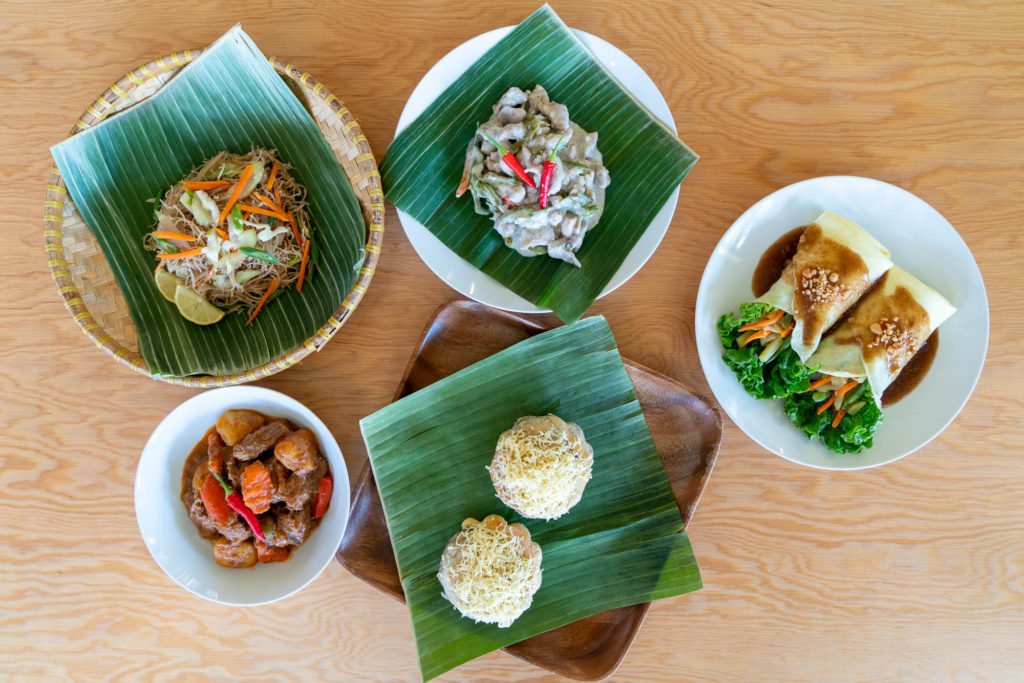
At Wengay’s Kitchen, Krizia showcases traditional Filipino cuisine. She strives for authenticity, incorporating different regions of the Philippines and using long-established cooking techniques and traditional ingredients. The menu features comfort food that will remind Filipinos of home while also delighting families and foodies.
Try the lumpiang sariwa, a fresh version of traditional lumpia, loaded with veggies and covered in a sweet and savory sauce, or the ube ensaymada, a dense bun filled with ube jam.
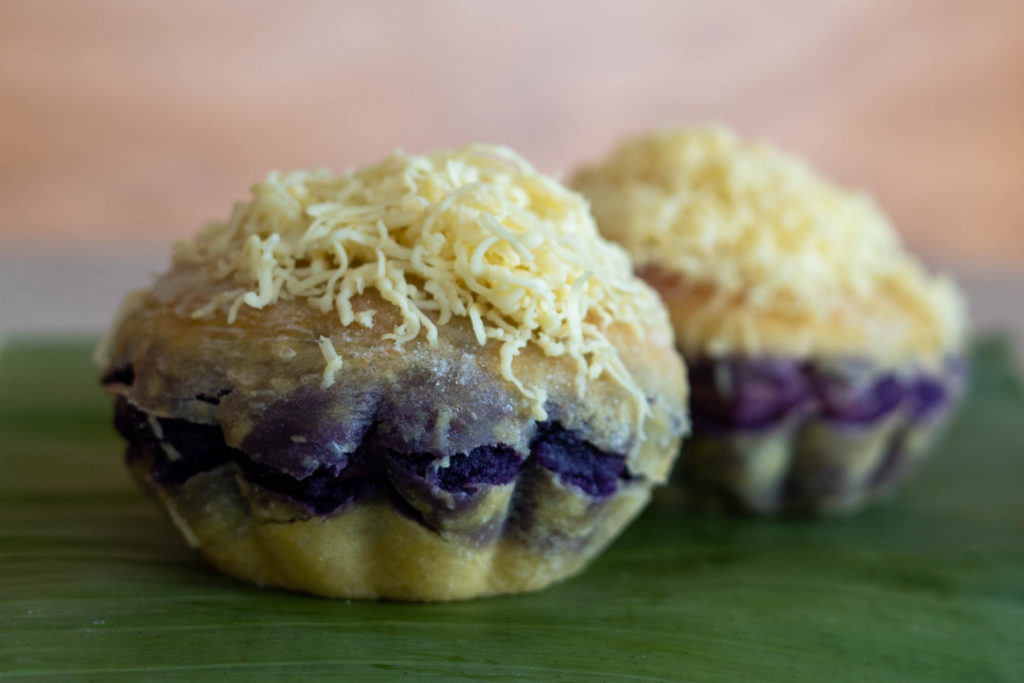
Read our Q&A with Krizia to learn about Filipino cuisine, her motivation for starting Wengay’s Kitchen, and her dream for her business.
What kind of cuisine do you serve at Wengay’s Kitchen?
Wengay’s Kitchen specializes in traditional and authentic Filipino cuisine, including traditional baked goods and desserts.
What makes Filipino cuisine special?
Because of Philippine’s dense history and vast archipelago, the cuisine is quite unique. Filipino food showcases a colorful combination of sweet, tangy, and salty flavors. Rice, meat, and an array of vegetables are the main staples, mixed with a variety of aromatic herbs and spices. From indigenous recipes, to diverse regional ingredients and methods, and the influences brought over by other nations, each dish has its own story. It’s like a culture trip in your mouth!
What sets Wengay’s Kitchen apart from other eateries?
There are limited traditional Filipino restaurants in our area. My goal is to provide a sense of home and comfort for anyone trying our food, but especially for our local Filipinos. Currently, Filipino food has been trending and people are starting to become interested in our cuisine. However, this trend and curiosity has been introduced by Filipino fusion food. Although this interpretation and perspective on our cuisine is great and creative, it lacks the interpretation of history and culture that I want to share. My goal is to share authenticity through my food. I want to share a traditional menu without the frills of fusion. I want to incorporate different regions of the Philippines through my menu by keeping the long-established cooking practices and traditional ingredients as a way to celebrate and honor our culture.
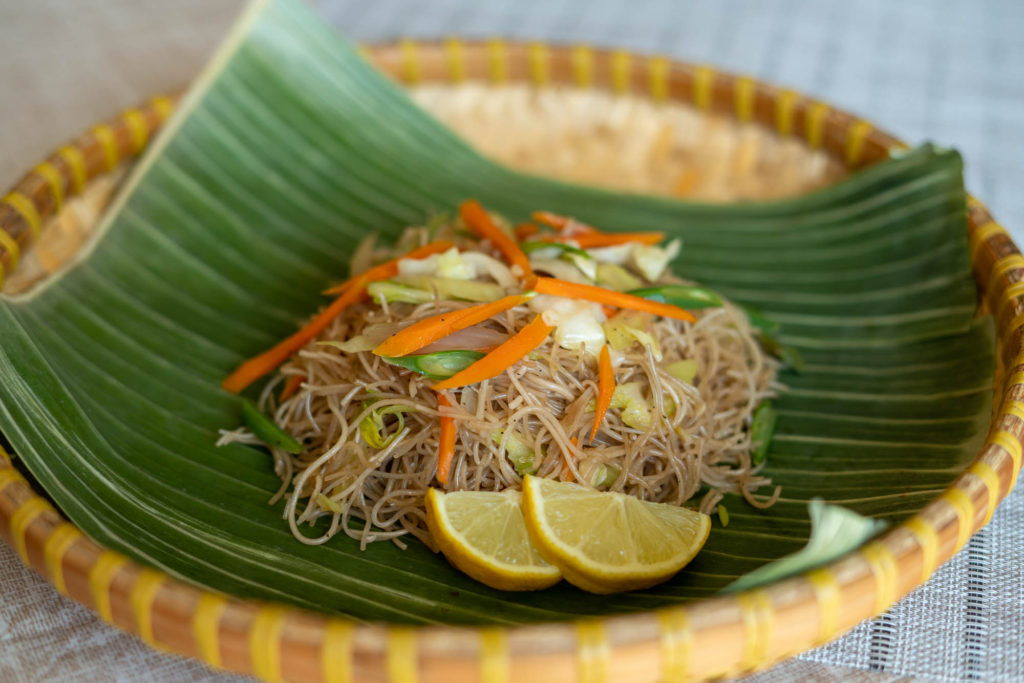
Why did you want to start this business?
Ever since I was a child, I had always been in the kitchen helping my mom with chopping or stirring. I had always wanted to help, even if I just ended up being a nuisance. The preparation and creating of dishes had always been so fun to me.
When I was in college, I just randomly decided to fry donuts from scratch. I started to give some to my friends and soon some of them started ordering by the dozens! From creating something from scratch, to watching my friends love what I also loved, it was something I didn't expect to completely enjoy. From then on, I started to learn how to make traditional Filipino food from my mom. I completely immersed myself into learning new dishes or baked goods. It was then that I wanted to keep sharing what I enjoyed doing.
My main motivation in starting this business is to share what I love and share what I enjoy doing. After going to school for a completely different career, I realized starting this business will help me reach my full potential and my most genuine self. Through this self-expression, I will be able to connect and create relationships with people through food and service. I want to connect with my community especially. The process of starting a business has helped me learn accountability, leadership, responsibility, and empathy towards a more fulfilling work.
What challenges have you encountered trying to establish your business?
For me, the hardest part was the initial stage of starting a business. I really didn’t know where to begin. After forming my business idea and doing lots of research, everything became so overwhelming, that it discouraged me from pushing forward. Fortunately, I stumbled upon FIN! From learning about the incubator program, to formulating menus, logos, and so much more, I have been less overwhelmed with the whole process. With the guidance and encouragement from all the admirable women I have been blessed to work with, I am so glad I don’t have to go through this all alone.
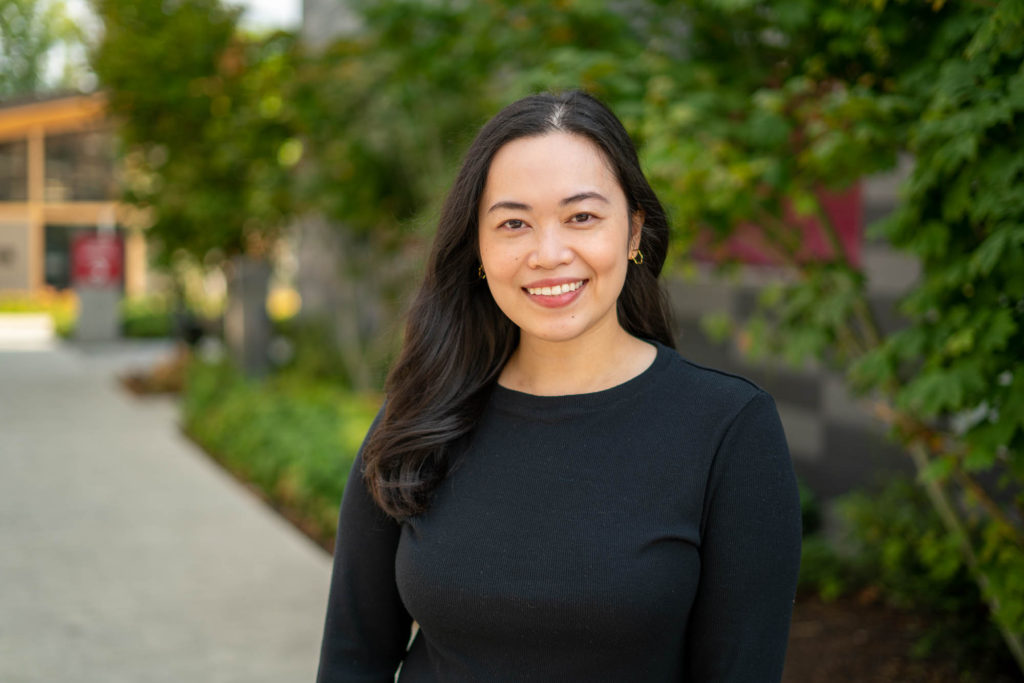
What is your dream for your business?
My ultimate dream is to be able to have a brick and mortar restaurant that I can call my own home. But for now, my goal for this business is to be able to share what I enjoy making. My dream is to share my culture and my authenticity through the dishes I create.
Visit Spice Bridge
Come by Spice Bridge to order food from Wengay’s Kitchen and other rotating vendors. We have takeout and outdoor dining available, and we’re also working on delivery options—stay tuned!
Wengay’s Kitchen is open at Spice Bridge on Tuesdays and Wednesdays from 11 a.m. to 8 p.m., and on Sundays from 10 a.m. to 5 p.m. Wengay’s Kitchen is also available to cater events.
Contact Wengay’s Kitchen
- Email: krizia@wengayskitchen.com
- Instagram: @wengayskitchen
- Facebook: @wengayskitchen

Thanks to FIN volunteer Lily Rybarczyk for assistance writing this Q&A!
Press Release: Immigrant and Refugee Chefs Cook Up a World of Cuisines At New Spice Bridge Food Hall
Contact: Kara Martin, kara@foodinnovationnetwork.org, 206-850-2877
TUKWILA, WA—What does South King County’s diversity taste like? Immigrant and refugee chefs are now answering that question at Spice Bridge, the newly opened food hall and commercial kitchen in Tukwila. Operated by the nonprofit organization Global to Local, Spice Bridge is the cornerstone of their Food Innovation Network (FIN) program, which helps aspiring entrepreneurs launch and build food businesses.
“Spice Bridge allows for food entrepreneurs to make an income and show their potential, and also gives our community the ability to experience and appreciate the diversity of cultures through food,” said longtime Tukwila resident Ehler Win, who co-chairs the FIN steering committee.
Eight food vendors rotate through four stalls in the sunlit food hall, offering a new dining experience every day. With indoor dining currently restricted, the initial group of eight women-owned businesses are offering takeaway meals and making use of outdoor seating in the new Tukwila Village development. Entrees ranging from Congolese to Cambodian are priced from $8 to $16, served every day but Monday.
“We in the City of Tukwila are super excited to welcome Spice Bridge to the community,” said Tukwila Mayor Allan Ekberg. “Their mission to help women of color and immigrants start and grow thriving businesses is a perfect fit for our city because we are so wonderfully diverse. I feel the Spice Bridge food hall will become the favorite spot for people to connect through food. It will also add to the flavor of Tukwila Village as a central gathering place for all our community. I can’t wait to enjoy the varied cuisine one will find at the Spice Bridge food hall.”
Food businesses have traditionally been a way for many striving immigrants and low-income families to gain a foothold in the economy. However, skyrocketing real estate and rental rates make it difficult for these entrepreneurs to access commercial kitchen and restaurant spaces in South King County.
Spice Bridge provides the space and support to help these entrepreneurs launch and scale to successful businesses. The new 2,800-square-foot facility includes a commercial kitchen with four cook stations, four food retail stalls, and a community dining area. The space can accommodate up to 20 food businesses that either rent retail stalls in the public dining area, or use the kitchen for off-site sales, such as catering, farmers markets and packaged products. Subsidized kitchen and retail space is just one element of FIN’s program—they also assist entrepreneurs with all aspects of starting a business, from licensing and permitting to menu development and marketing.
In addition to helping to create economic security for business owners and their families, Spice Bridge helps build food security. The space supports FIN’s Tukwila Village Farmers Market, which makes fresh, local produce affordable and accessible for community members. Spice Bridge is also utilized for FIN’s community meals initiative, which has provided more than 8,000 no-cost meals for seniors and families in need.
Spice Bridge is funded by individual and corporate contributors, a Washington State grant, the Port of Seattle, and King County and Seattle Foundation’s Communities of Opportunity initiative.
Location and schedule
Spice Bridge is located in Tukwila Village at 14200 Tukwila International Blvd. Suite 141, Tukwila, WA 98168. Free parking is available between Spice Bridge and the Tukwila Library.
Takeout and outdoor dining is available from 11 a.m. to 8 p.m. Tuesday through Saturday, and from 10 a.m. to 5 p.m. on Sunday.
Food vendors
- Taste of Congo, the only Congolese food business in Washington, offers grilled meats and hearty stews. Open Tuesday, Saturday, and Sunday.
- Afella Jollof Catering cooks up authentic Gambian/Senegalese cuisine. Open Tuesday, Wednesday, and Thursday.
- Seatango crafts artisan empanadas and sweet pastries from Argentina. Open Wednesday, Thursday, and Friday.
- Moyo Kitchen serves Somali-Kenyan-Tanzanian fusion food inspired by Zanzibar, the world’s spice capital. Open Friday, Saturday, and Sunday.
- Wengay’s Kitchen offers authentic Filipino food prepared with traditional ingredients. Open Tuesday, Wednesday, and Sunday.
- Theary Cambodian Foods serves healthy, authentic Cambodian/Khmer cuisine. Open Thursday, Friday, and Saturday.
- WUHA offers fast Ethiopian food options, serving both authentic foods and American foods cooked with Ethiopian spices as a gateway to more traditional dishes. Open Tuesday, Wednesday, and Sunday.
- Jazze’s cooks up Afghan food made from organic, locally grown ingredients. Open Thursday, Friday, and Saturday.
About Global to Local and Food Innovation Network
A program of Global to Local, the Food Innovation Network enhances the local food system, increases access to healthy foods, and supports local food businesses in the diverse communities of SeaTac/Tukwila and South King County. Global to Local is a SeaTac-based nonprofit organization whose programs embody a racial and ethnic approach to ensure all South King County communities have the opportunity to thrive.
